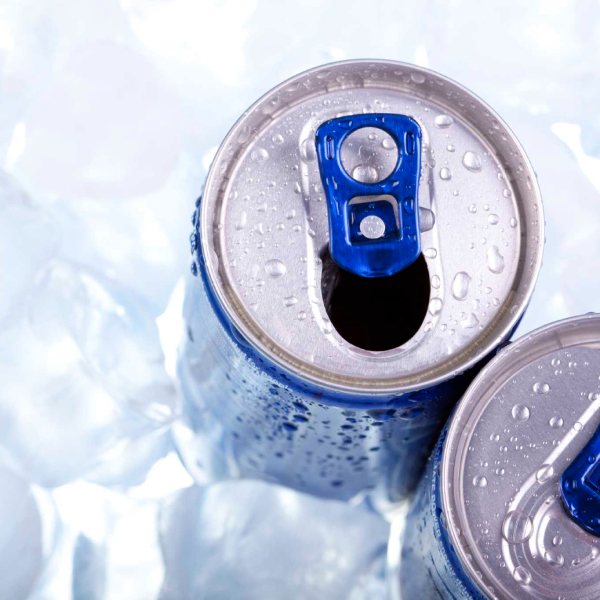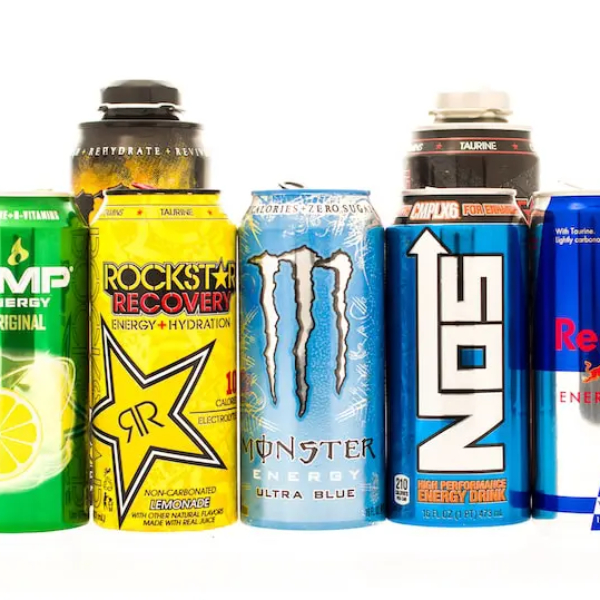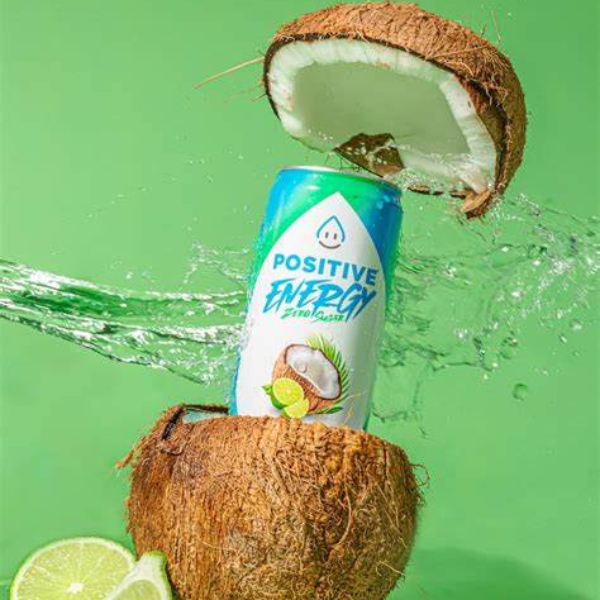The Rise of Energy Drinks and Health Concerns
The energy drink market has exploded since the 1980s. Brands like Red Bull, Monster, and Rockstar dominate shelves. Yet, health experts raise concerns. High caffeine and sugar levels link to health risks. These drinks look harmless but hold a dark secret on their labels. Marketed to the young, their sales climb despite warnings. FDA scrutiny has yet to slow their popularity. We must ask, what’s in these drinks? Why the concern? Read on to uncover the harmful effects. Despite their popularity among youth, the increasing sales of energy drinks like Red Bull, Monster, and Rockstar raise urgent questions about the harmful ingredients in energy drinks and the health risks associated with high caffeine and sugar levels, prompting a call for greater awareness and scrutiny.

Key Ingredients That Make Energy Drinks Harmful
When examining energy drinks, several ingredients stand out for their potential health hazards. Here, we delve into the key components that can make these beverages more harmful than helpful.
Excessive Caffeine Levels
Energy drinks often boast high caffeine contents. This stimulant can lead to heart palpitations and high blood pressure. Overindulging in caffeine may cause serious cardiovascular issues. Many energy drinks contain harmful ingredients, including high levels of caffeine, which can result in heart palpitations and elevated blood pressure, posing serious risks to cardiovascular health when consumed excessively.
Overabundance of Sugar
Sugar is a primary energy drink ingredient. Excessive sugar intake can lead to obesity, diabetes, and tooth decay. It can also cause energy spikes followed by crashes.
Use of Artificial Sweeteners
For ‘diet’ energy drinks, artificial sweeteners replace sugar. These can lead to digestive discomfort and may disrupt the body’s insulin response.
Harmful Artificial Flavorings and Preservatives
These chemicals can have negative impacts on health. Long-term effects of these substances are still being researched, raising concerns for consumer safety.
Taurine and Its Effects
While taurine is an essential amino acid, high doses in energy drinks may have adverse effects, especially on the developing brains of young adults.
High B Vitamin Content
Energy drinks may contain B vitamins far exceeding daily recommendations. Too much can cause nerve damage and liver toxicity, raising health risks.
These ingredients, often found in high quantities in energy drinks, have the potential to harm rather than help, especially when consumed in excess. Their damaging effects range from acute physical discomfort to serious, long-term health issues. Users should exercise caution and consider healthier alternatives when seeking an energy boost. If you’re struggling with how to quit energy drinks, it’s essential to recognize the potential harm they can cause and explore healthier alternatives that provide a natural energy boost without the adverse effects.
The Health Risks Associated with Caffeine Overconsumption
Caffeine is a popular stimulant in energy drinks. People like it for the alertness it brings. But high doses of caffeine can lead to health issues. This is especially true when consumed in energy drinks.
Caffeine can cause heart problems. It speeds up the heartbeat and raises blood pressure. Consuming too much can trigger heart rhythm issues. It can also lead to other symptoms like dehydration, insomnia, and headaches.
The risk increases when people have too much caffeine. Energy drinks often contain more caffeine than coffee or soda. Some have up to five times more. This makes it easy to consume high amounts.
Young adults and teenagers are particularly at risk. Their bodies are still growing and developing. Too much caffeine can harm their developing brains. It can also affect their heart health.
Symptoms like jitteriness and anxiety are common with caffeine overuse. These can impact daily life and well-being.
In the most severe cases, caffeine overdose may occur. This is rare but can be life-threatening. Symptoms include panic attacks, irregular heartbeat, and seizures.
Drinking moderate amounts of caffeine is generally safe for most people. But it is vital to be aware of the risks. Knowing the signs of overconsumption can help prevent harm. Also, considering healthier alternatives to energy drinks is wise.

How Sugar and Artificial Sweeteners in Energy Drinks Affect Your Health
Energy drinks often pack a sweet punch. They use sugar to provide quick energy bursts. But, this comes at a cost to your health. High sugar intake leads to obesity, diabetes, and more. It also causes sharp energy highs followed by lows.
The Problem with Sugar
Sugar is a main ingredient in many energy drinks. It adds calories without any nutrients. These empty calories can lead to weight gain. Over time, they increase the risk of chronic diseases.
Too much sugar upsets your blood sugar balance. It creates spikes and crashes. This can leave you feeling tired and hungry again soon after.
Artificial Sweeteners: A Hidden Hazard?
Some energy drinks boast a ‘no sugar’ label. They use artificial sweeteners instead. These might reduce calories, yet they come with their own risks.
Artificial sweeteners could disrupt your body’s insulin response. They might cause digestive issues for some people. There is a debate on their long-term safety.
These sweeteners can trick the brain. They keep your cravings for sweets alive. This makes it harder to cut down on sugar overall.
A Balancing Act for Health
Balancing energy intake with health is key. Relying on energy drinks for a quick fix is not wise. They may provide short bursts of energy but harm health over time.
Choosing drinks with less sugar or artificial sweeteners is better. Even better, consider natural alternatives. Opt for water, herbal tea, or a piece of fruit for a healthier energy boost. These choices support a healthy lifestyle more sustainably. While Zoa energy drinks can provide a quick boost, opting for healthier choices like water or herbal tea can enhance your overall well-being. By reducing sugar intake and choosing natural alternatives, you not only support a healthier lifestyle but also enjoy a more sustainable energy source.
The Impact of Taurine and B Vitamins on the Body
Energy drinks often contain taurine and B vitamins. These can be beneficial in small doses. But, in the large amounts found in energy drinks, they can have negative impacts on health.
How Taurine Affects Your Health
Taurine supports many of our body’s functions. But too much can harm you. It may damage your brain, especially in young people. Animal studies suggest taurine and caffeine can be a harmful mix. Always think about how much taurine you consume in energy drinks.
B Vitamins: Too Much of a Good Thing?
B vitamins aid in energy production and more. Energy drinks sometimes have very high B vitamin levels. Exceeding daily limits can lead to nerve damage and liver issues. For instance, too much niacin, or B3, can cause skin and stomach problems. It’s important to keep an eye on B vitamin intake when consuming these beverages. While energy drinks can provide a quick boost, it’s crucial to be aware of how long does it take for energy drinks to work, as excessive consumption of B vitamins can lead to serious health issues like nerve damage and liver problems. Moderation is key to enjoying the benefits without the risks.
Both taurine and B vitamins are crucial. But they must be consumed in proper amounts to avoid health risks. Energy drinks may not be the best source for these nutrients. Consider getting them from a balanced diet instead. This way, you can avoid the harmful ingredients in energy drinks.
The Dangers of Mixing Energy Drinks with Alcohol
Energy drinks and alcohol are a popular mix among some, especially in nightlife scenes. But, this combination poses serious health risks. The contrasting effects of energy drinks and alcohol can deceive drinkers. Energy drinks are stimulants, while alcohol is a depressant. When combined, the stimulating effects of energy drinks can mask the depressant effects of alcohol. This can lead to consuming more alcohol than intended, as energy drinks might reduce the perception of intoxication.

Increased Risk of Binge Drinking
Mixing energy drinks with alcohol can lead to binge drinking. People may not feel as drunk as they truly are. This illusion encourages more drinking, increasing alcohol poisoning risks.
Heart and Nervous System Dangers
The dueling effects of these drinks strain the heart and nervous system. Palpitations and high blood pressure can occur. It can also lead to stressful effects on the nervous system.
Poor Decision-Making and Risk of Accidents
The alertness from caffeine may lead to overconfidence. This can cause poor decision-making. The chance of accidents or risky behavior goes up.
Regulatory Concerns
Energy drink labels seldom warn against mixing with alcohol. This lack of guidance is troubling. Without clearer warnings, the young and uninformed remain at high risk. Regulatory bodies struggle with controlling this issue.
Mixing energy drinks with alcohol is dangerous. It may lead to higher consumption, heart stress, impaired judgment, and increased accidents. Officials and brands must address the risks that come with this trend. Healthier choices should be promoted to protect public safety.
Regulatory Challenges and Misleading Health Claims
The regulation of energy drinks presents real challenges. The FDA does not control energy drinks as it does with other beverages. The reason is these are often classified as dietary supplements. This can ?lead to less oversight over the ingredients used in energy drinks. Also, the health claims made by these drinks can be misleading. Companies may say their products improve attention or increase endurance. However, scientific support for these claims is not always strong. Some claims have even been debunked.
Lack of Clear Labeling Standards
Labels on energy drinks often miss clear health warnings. They may not show the high caffeine levels these drinks contain. Without clear labels, consumers may not understand the health risks. This is a real problem, especially for young users. They may overconsume without knowledge of the potential harm.
Health Claims and Marketing Strategies
Energy drink brands often target young adults and teens. They do this with ads that appeal to these age groups. They promise boosts in energy and concentration. Yet, these claims can be false or exaggerated. This attracts consumers looking for instant performance gains.
The Need for Stricter Regulation
Medical experts and consumer advocates call for stricter rules. They want clear labeling and a ban on false health claims. Some suggest age restrictions for purchasing energy drinks. This is due to the harmful ingredients in energy drinks. These calls for change show the need for better industry standards to protect public health.
Healthier Alternatives to Traditional Energy Drinks
The quest for energy boosts often leads us to traditional energy drinks. However, with concerns over harmful ingredients, it’s worth exploring healthier alternatives.
Choosing Natural Sources of Caffeine
Opt for beverages that contain natural caffeine, like green tea or coffee. These provide a gentler increase in energy without the extreme highs and lows.
Sugar-Free and Low-Calorie Options
Search for drinks that have no added sugar or are low in calories. These options can reduce the risk of weight gain and blood sugar spikes.
Nutrient-Rich Smoothies
Blend fruits, veggies, and a small amount of caffeine from natural sources for a nutritious energy kick. This way you get vitamins and minerals too.
Herbal Supplements
Consider supplements like ginseng or guarana, which can increase energy levels. Always check with a health professional before starting any new supplement.
Staying Hydrated with Water
Simple hydration with water can often restore energy. Sometimes fatigue is a sign of dehydration, so water can be an effective remedy.
Balanced Eating for Sustained Energy
Consuming a balanced diet with complex carbohydrates, protein, and fats offers lasting energy. Foods like whole grains, nuts, and lean meats are great choices.
Exercise for Natural Energy
Regular physical activity can boost energy levels naturally. Exercise increases blood flow and releases endorphins, which can make you feel more alert.
These healthier alternatives focus on sustained energy and overall well-being. By choosing them over traditional energy drinks, you can avoid the short-term jolt and long-term health risks.